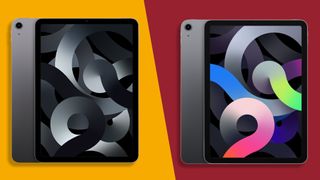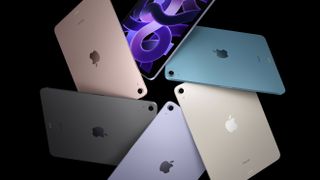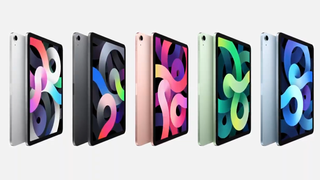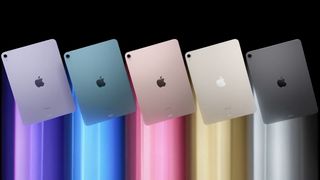
Apple's Peek Performance event is in the rear-view, and in among the announcements sits the iPad Air 2022. It might look a lot like the iPad Air 4, but there are some notable improvements here.
We won't know how pronounced those improvements are, and where it will sit in our best tablets list, until we've had a chance to review the iPad Air 2022, but purely based on what we know of its specifications, we have a pretty good idea of how the two compare.
So how do Apple's two latest mid-range to tablets stack up to one another? Let's take a closer look at those facts and figures.
iPad Air 2022 vs iPad Air 4: price and availability
The iPad Air 2022 ships on March 18, with prices starting from $599 / £569 / AU$929 for the 64GB Wi-Fi model. This moves up to $749 / £719 / AU$1,159 for the 256GB unit.
There's also a 5G cellular option that costs $749 / £719 / AU$1,159 for 64GB and $899 / £869 / AU$1,389 for 256GB.
The iPad Air 4 shipped on October 23, 2020, with Wi-Fi only prices starting at $599 / £579 / AU$899 for the 64GB model, and 256GB: $749 / £729 / AU$1,129 for the 256GB variant.

iPad Air 2022 vs iPad Air 4: design
The iPad Air 2022 sports much the same design as the iPad Air 4. That is to say, it still resembles an iPad Pro, which was one of the big additions to the previous generation.
Get the best Black Friday deals direct to your inbox, plus news, reviews, and more.
Sign up to be the first to know about unmissable Black Friday deals on top tech, plus get all your favorite TechRadar content.
It's got the same flat edges, a USB-C port instead of Lightning, minimal bezels all around, and an edge-to-edge display. Like last year's model, you still get a Touch ID scanner stashed behind a button to the side of the tablet, and not the Face ID system of the Pro.
The iPad Air 2022 comes in Space Gray, Starlight, Pink, Purple, and Blue. The iPad Air 4 came in Space Gray, Silver, Rose Gold, Green, and Sky Blue.
At 247.6 x 178.5 x 6.1mm, the newer tablet is identically proportioned to the iPad Air 4. At 461g, however, it's fractionally (3g) heavier.

iPad Air 2022 vs iPad Air 4: display
Apple has kept exactly the same display for the new iPad Air 2022. That works out to a 10.9-inch Liquid Retina LCD with a 2360 x 1640 resolution and a 500 nit peak brightness.
The new tablet again fails to gain the iPad Pro's ProMotion display, which would have bumped the refresh rate up from 60Hz to 120Hz. That's not surprising, however, as Apple still sees this as a 'Pro' feature.
We said about the iPad Air 4 display that it was "a great size and fantastic quality, and you'll be happy with it whatever you use this slate for".
We suspect that the same will be true of the iPad Air 2022, though perhaps a little less so given the 17 month gap that separate the launches of these two slates.

iPad Air 2022 vs iPad Air 4: camera
Again, the iPad Air 2022's 12MP rear camera appears to be much the same as the iPad Air 4's.
That said, the new iPad Air does benefit from a much more advanced M1 processor (more of which in a moment), which will bring with it more advanced image processing. Apple is a dab hand at such algorithmic advances, so don't hold that apparent lack of hardware improvements against it.
Apple specifically mentions that Smart HDR has been added thanks to this M1 power, so we're expecting tangible improvements. Not that a tablet's rear camera matters all that much.
The real and more important difference here lies with the 12MP front-facing camera, which is up from 7MP in the iPad Air 4. More significantly, this camera gains an ultra-wide perspective and Center Stage support.
The latter feature, which is present across the rest of the iPad range, will pan and zoom automatically (within reason) to track its subjects.
iPad Air 2022 vs iPad Air 4: specs and performance
As we've just referenced, the big step up with the iPad Air 2022 relates to performance. It gains the M1 chip that powers the latest iPad Pro, not to mention Apple's current MacBook and iMac lines.
Apple's M1 chip provides a 60% CPU boost over the A14 Bionic of the iPad Air 4, alongside a 2x GPU performance boost. A 16-core Neural Engine should enable the iPad Air to perform laptop-level tasks, such as speedy advanced image editing in Adobe Lightroom.
Another advantage for the new iPad Air is that its cellular model features 5G connectivity. The iPad Air 4 could only supply 4G connectivity.
One final spec advantage for the iPad Air 2022 is quite easy to overlook, but its USB-C port is capable of double the transfer speed of the iPad Air 4 equivalent.
Both iPads come with second-generation Apple Pencil support, so there's no clear winner when it comes to artistic potential.

iPad Air 2022 vs iPad Air 4: battery
The new iPad Air has a 28.93 Wh battery, which equates to 7606 mAh. That's exactly the same size as the iPad Air 4 cell.
We don't have a problem with that, as the iPad Air 4 could keep going for around 10 hours before we had to to reach for the charger. Our reviewer described it as "very good", and claimed that "most users should be perfectly happy" with it.
We're hoping for some gains on that figure thanks to the more efficient M1 processor, but we're not expecting a drastic increase.
The iPad Air 2022 supports up to 20W wired charging, compared to 18W for the iPad Air 4.
Takeaway
Apple has made fairly incremental improvements for the iPad Air 2022, except for one major area.
In bringing its M1 chip to its mid-range tablet line, it's offering serious power for the money. We're talking about high-end laptop levels of power for around the $600 mark, which is quite startling when you think about it.
Given that the iPad Air 4 had already dragged the design of the Air line forward to the current Pro era, we're not too bothered about the superficial similarities of these two tablets.
It would have been nice to see some display improvements, but there we guess there has to be some perks for those willing to pay the Pro premium.
While it doesn't appear likely to offer a worthwhile upgrade for most iPad Air 4 owners, then, the new iPad Air looks set to maintain Apple's untouchable status at the middle point of the tablet market.
Most Popular

